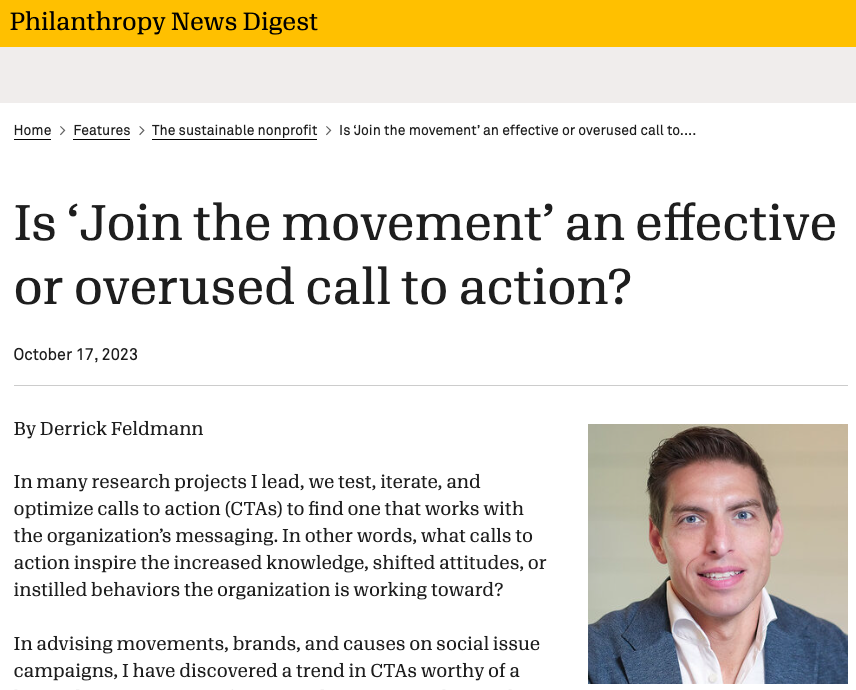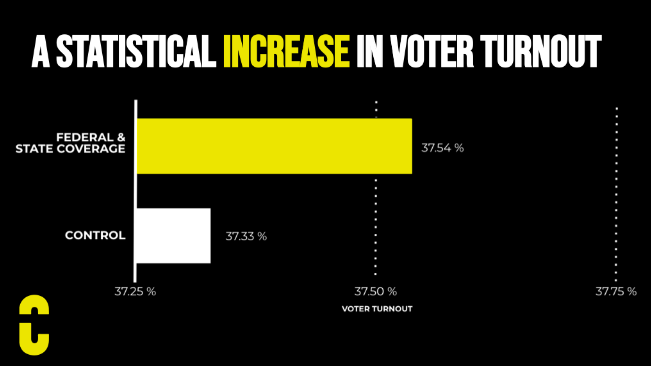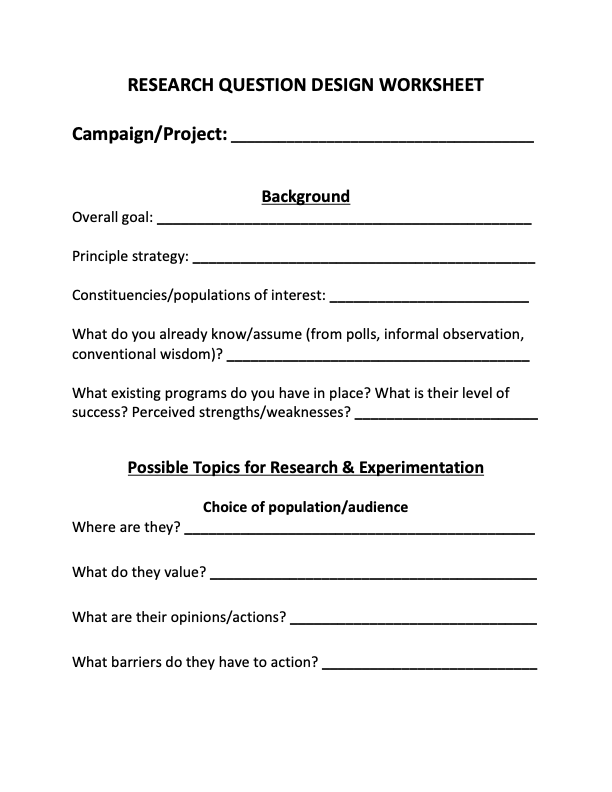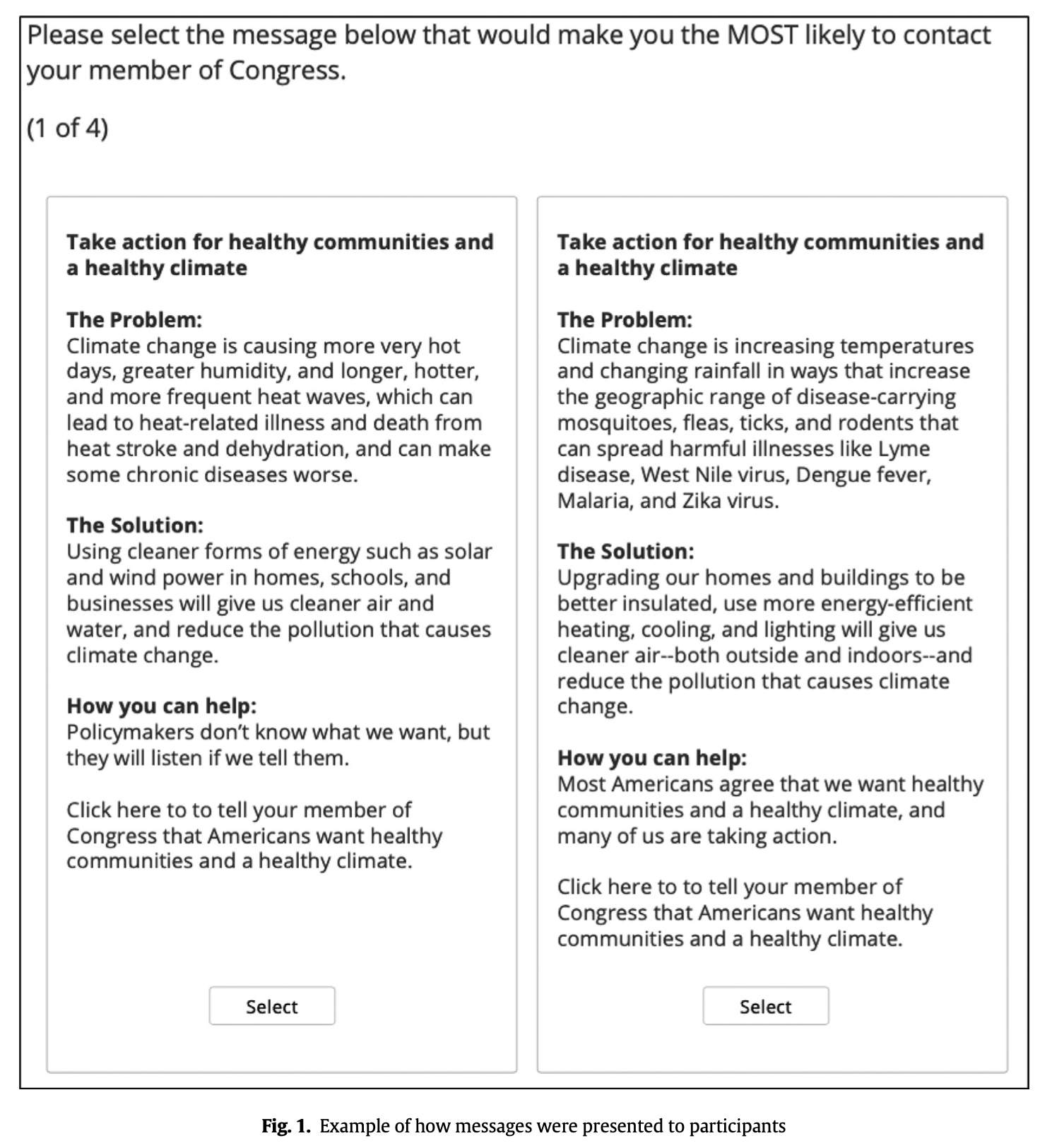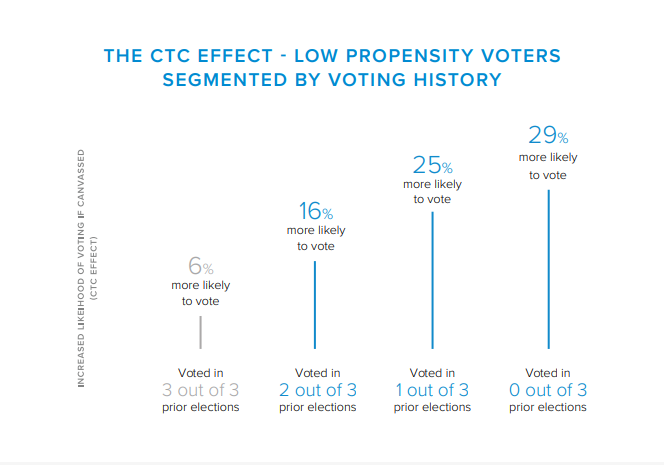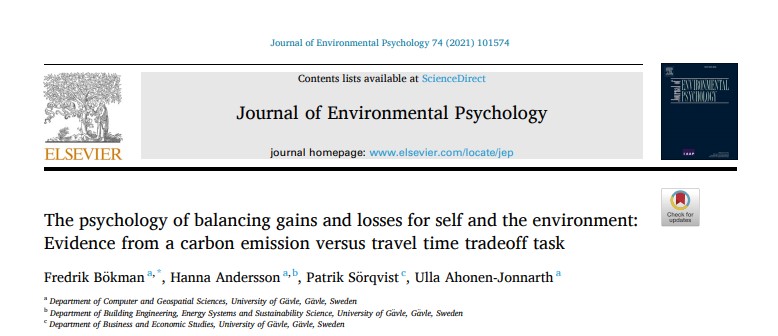Resources
Search below for resources covering the intersection of climate engagement, social science and data analytics.
RESULTS
Is ‘Join the movement’ an effective or overused call to action?
“Join the movement” is a compelling call-to-action (CTA) with people who are already persuaded and more likely to engage anyway. Those who join in response to this CTA tend to already be aligned with the organization’s position and demands, advocating for the social issue and/or participating in a similar movement or organization. “Join the movement” is ineffective with people who aren’t already receptive. Those not already in alignment with, knowledgeable about, or still in the formative stages of deciding where they stand on a social issue are less inclined to engage or see this CTA as motivational (regardless of how “Join the movement” is framed).
Case Study: COURIER’s Model Boosts Voter Turnout
Delivering more political information to voters makes them vote more. COURIER’s unique method of boosting news on social media had a positive, statistically significant impact on voter turnout in the 2021 Virginia state election. There were two kinds of news tested on voters: local coverage of the Virginia 2021 gubernatorial race and candidates and localized coverage of federal policy solutions. These kinds of localized political news increased voter turnout by 0.2%. This experiment was tested on a pool of roughly 1 million Virginia voters on social media from September to November, 2021.
Environmental Polling Roundup - September 24th, 2021
This post includes a roundup of climate + environment headlines from this week’s public polls, good data points to highlight, and a full roundup with key takeaways from each poll - including lots of timely new polling on the Build Back Better plan.
HEADLINES
- Yahoo + YouGov - Americans support Biden’s “$3.5 trillion infrastructure plan” by double digits, and a plurality support using the budget reconciliation process to overcome a Republican filibuster (Topline, Crosstabs)
- POLITICO + Morning Consult - Voters widely support tax breaks for renewable energy in the reconciliation bill, even when it’s framed as a Democratic proposal (Topline, Crosstabs)
- Data for Progress + Invest in America - Voters support the Build Back Better plan by a two-to-one margin after reading an explanation of its components; grid modernization continues to be one of the plan’s most popular provisions (Release, Topline)
- LCV + Climate Power - Majorities of voters across Democratic-held U.S. Senate battleground states (AZ, CO, GA, NH + NV) support the Build Back Better plan after a brief description, and majorities also reject the idea of trimming the bill down; top messages focus on jobs, pollution/health, and lowering utility bills (Deck, Memo, AZ Topline, CO Topline, GA Topline, NH Topline, NV Topline)
- Navigator - Climate is rising as a national priority; two in five voters say that weather in their community this summer has been different from past years, and most who have experienced unusual weather cite climate change as the reason (Release, Deck, Topline)
- Data for Progress - “Green jobs” are a confusing concept for voters (Memo)
- Yale Program on Climate Change Communication - Moderates have similar reactions to “climate change” and “extreme weather” as the rationale for emergency preparedness actions and policies, but there are benefits to using “extreme weather” with conservative audiences (Article)
Research question development worksheet
Prompts to help you think through developing a research project, from big-picture strategy to the specifics of a hypothesis.
Advocacy messages about climate and health are more effective when they include information about risks, solutions, and a normative appeal: Evidence from a conjoint experiment
A good formula for leveraging health messaging for climate advocacy: Tell people about the health consequences of climate change, health benefits of climate solutions, and include a call-to-action. This experiment found that each of these categories was worth including in a message to help motivate Americans to contact Congress. Within each of these categories, a variety of specific types of information were tested, with the most effective overall combination being a message that first described the negative impacts of climate change on air quality, then explained how transitioning to clean energy will benefit people’s health, and ended by explaining that most Americans support this solution, and many are taking action to advocate for it.
Climate Change in Your Backyard: When Climate is Proximate, People Become Activists
As climate change is perceived (or experienced) to be more proximate, people are more likely to take political action. A survey experiment of Californians found an 11% increase in climate activism (message writing to policymakers) among respondents who were primed with messages emphasizing the temporal and physical proximity of climate vs. the placebo group.
Research findings suggest that climate organizers should:
- Frame climate change in a way that reduces psychological distance by using the present tense and talking about it as issue that is happening "here and now"
- Avoid overly-negative messages which can de-motivate action by reducing efficacy
- Focus on the concrete actions that will help solve the problem
Changing the Conversation Together: Evaluating Impact, 2020
Changing the Conversation Together (CTC) is working to create a network of deep canvassers to grow the American electorate into a more inclusive and compassionate one. Deep canvassing is a method of voter engagement that draws on respect and shared experiences to encourage voter turnout. In this report, CTC examines the impact that their deep canvassing had both on turnout and vote choice. They find that CTC canvassing increased the likelihood of turnout by approximately 14%. For low propensity voters, those least likely to turnout, CTC finds that their efforts increased the likelihood that they voted by 25%. They also find that deep canvassing cannot wait until the last minute. These conversations need to be happening often and well-before election day. Advocates interested in making an impact at the polls should consider diverting even modest resources to deep canvassing, particularly for less likely voters.
The psychology of balancing gains and losses for self and the environment: Evidence from a carbon emission versus travel time tradeoff task
Motivational messaging can encourage people’s willingness to make trade-offs in favor of the environment. In this study, researchers find that giving people information about how longer air travel times reduce carbon emissions make people more willing to have longer travel times. This willingness was even higher for those who were told the travel time would be much longer, rather than just a little longer. Finally, the authors also find that the effects of messaging are strongest among those with higher levels of environmental concern. Members interested in encouraging trade-offs in favor of the environment should consider motivational information framing.
Should it be called “natural gas” or “methane”?
Emphasize "methane" and don't use "natural" in language referring to the substance sometimes referred to as "natural gas". In testing the positve and negativ assocations with the phrases “natural gas,” “natural methane gas,” “methane,” or “methane gas”, among Americans, the term “natural gas” evokes much more positive feelings than do any of the three methane terms. Conversely, the terms “methane” and “methane gas” evoke much more negative feelings than does “natural gas.” The hybrid term “natural methane gas” is in the middle — it is perceived more positively than “methane” or “methane gas,” but more negatively than “natural gas.” This pattern was true for both Democrats and Republicans, whereas further research from this team found that the additional terms “fossil gas” and “fracked gas” were more polarizing: viewed favorably by Republicans but very negatively by Democrats. So, if engaging an exclusively left-leaning audience, "fossil gas" or "fracked gas" may be the best choices.
Webinar: Winning By A Landslide: How we won the Portland Clean Energy Fund (PCEF)
How did the alliance behind the Portland Clean Energy Fund (PCEF) move a visionary idea from concept to groundbreaking reality? In this webinar, the Climate Advocacy Lab was joined in conversation with members of the PCEF Steering Committee for an "under the hood" look at the campaign's insights, challenges, and lessons learned –– also captured in a new, interview-based report that captures the "anatomy" of the campaign. This campaign secured a landslide ballot measure victory in Portland in November 2018, establishing a multi-million dollar municipal fund that will address climate, economic, and racial justice by providing funding for renewable energy projects, job training and apprenticeship programs, and regenerative agriculture.
Pagination
- Page 1
- Next page
